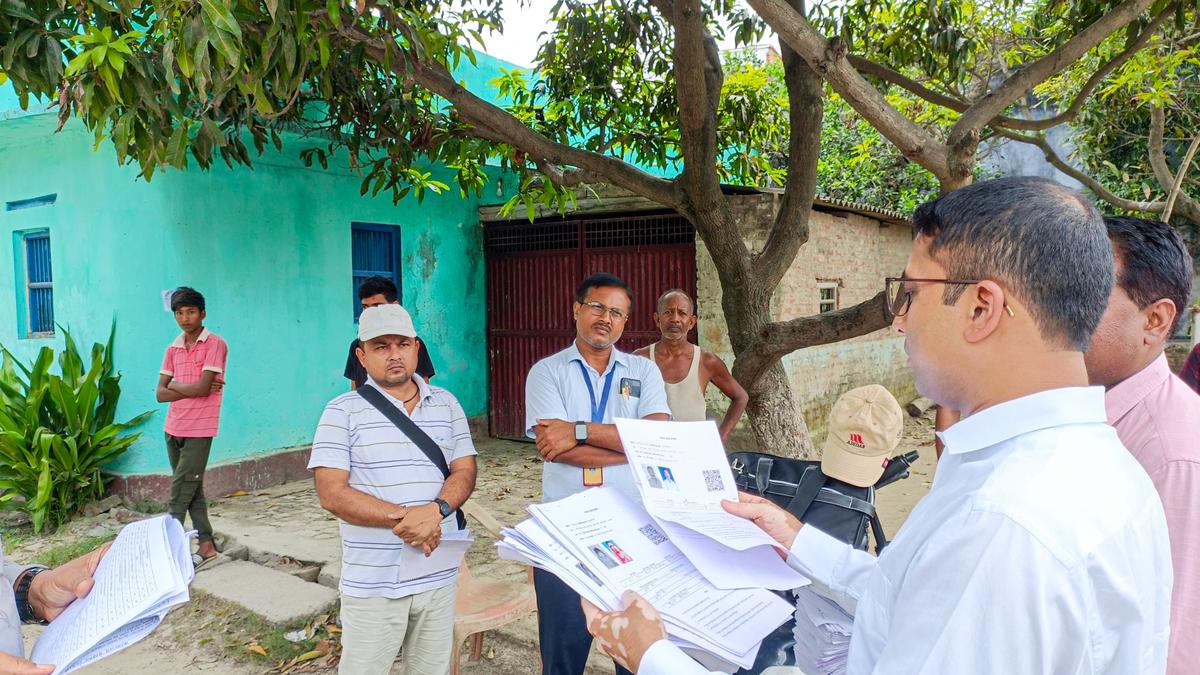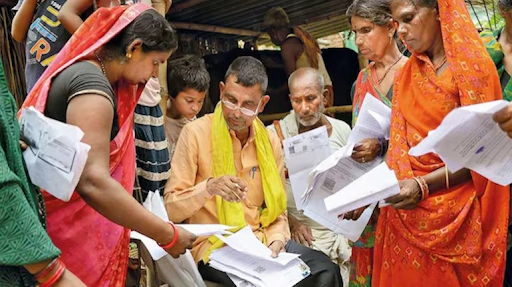Copyright infringement not intended
Picture Courtesy: THE HINDU
Context
The first phase of the Bihar Special Intensive Revision (SIR) exercise has been completed and the names of 65.2 lakh voters are likely to be excluded.
What is Special Intensive Revision (SIR) of Electoral Rolls?
The Election Commission of India (ECI) conducting Special Intensive Revision (SIR) in Bihar, the last revision was done in 2003.
Booth Level Officers (BLOs) conduct door-to-door surveys to confirm voter details, and update the voter lists.
What are the legal grounds to conduct the voter list revision?
Constitutional Provisions
- Article 324 empowers the ECI to "supervise, direct, and control" the preparation of electoral rolls.
- It also covers the conduct of elections for Parliament, state legislatures, and the offices of President and Vice-President.
- Article 326 ensures voting rights to every eligible adult citizen above 18 years of age (61st amendment reduced it from 21 years).
Statutory Provisions
- Representation of the People Act (RPA), 1950 deals with the preparation of electoral rolls and elections management.
- Section 21 empowers the ECI to prepare and revise electoral rolls, including the power to conduct "special revision" – authority for initiating SIR.
- Section 16 states that non-citizens cannot be on the electoral rolls.
- Section 19 sets the criteria to qualify for registration.
- Registration of Electors Rules, 1960 provides the step-by-step procedures for preparing and revising electoral rolls.
What are the Objectives for conducting SIR?
- Inclusion of All Eligible Citizens, especially new young voters
- Remove Ineligible voters to prevent electoral fraud.
- Eliminate Duplicate Entries to ensure the "one person, one vote" principle.
- Correct Errors like spelling mistakes, incorrect addresses, or wrong age details.
Why regular update exercise like SIR is important?
- Rapid Urbanization and Frequent Migration change the residence of individuals.
- Unreported deaths, name remain in voter list, may result bogus voting.
- To address Political Complaints/Allegations about "bogus voters" or manipulation of voter lists.
- Concerns about Inclusion of Foreign Illegal Immigrants, particularly in border states like Assam
|
The Supreme Court, in Sarbananda Sonowal vs Union of India (2005), has highlighted the seriousness of illegal immigration and its impact on the demographic profile, indirectly stressing the need for accurate electoral rolls.
|
What is the process of SIR?
- Pre-revision Activities: Training Officials, House-to-House Verification, Standardization of Addresses, Rationalization of Polling Stations.
- Publication of Draft Electoral Rolls for public inspection.
- Claims and Objections Period
- Citizens who find their names missing, or want to register for the first time, fill out Form 6 to apply for inclusion.
- If someone knows an ineligible person (e.g., deceased, non-citizen, duplicate) is on the list, they can file Form 7 for deletion.
- For errors in their own entry (like name spelling, address), citizens use Form 8.
- Inquiry by Electoral Registration Officer (ERO) to verify claims.
- After resolving all claims and objections, the ECI publishes the final, updated electoral roll.
What are the concern related to SIR?
Risk of Disenfranchisement
- Demanding Specific/Old Documents, such as birth certificates from before 1987 or parental birth certificates.
- Many marginalized communities, informal workers, or those born in rural areas might not possess such old or formal records.
- Burden of Proof Shifted on the citizen to prove their eligibility, rather than the state proving their ineligibility.
- Old records, poor quality photographs, or incorrect photo uploads can lead to voter identification issues.
- The Election commission in the Supreme court stated that "Documents like Aadhaar, ration cards, or even existing Voter IDs are not accepted as primary proof for citizenship or birth date".
- Updating migrant worker details or proving residence can be difficult, risking their exclusion from the electoral roll.
Way forward to make SIR more effective and inclusive
The ECI should accept widely accessible and verifiable identification documents like Aadhaar, ration cards, and existing voter IDs for residency verification.
Expand Aadhaar-Voter ID Linking with strong privacy safeguards, to automatic deletions of duplicate voter id without lengthy process.
BLOs need better training, clear instructions, and sufficient resources (e.g., modern digital devices, better pay) to conduct house-to-house surveys.
Improve real-time data sharing of Birth/Death between civil registration systems and the ECI, to update the voter list.
Must Read Articles:
Election Commission of India (ECI)
The One Nation, One Election
Source: THE HINDU
|
PRACTICE QUESTION
Q. Examine the powers and independence of the Election Commission of India. What are the key challenges it faces in upholding its constitutional mandate? 250 words
|
Frequently Asked Questions (FAQs)
The Election Commission of India is a permanent and independent body established by Article 324 of the Indian Constitution.
The UIDAI has clarified that Aadhaar is a means of identity verification and does not establish citizenship or domicile.
The MCC is a set of guidelines issued by the ECI for political parties and candidates to ensure fair play during elections, though it lacks statutory backing.







